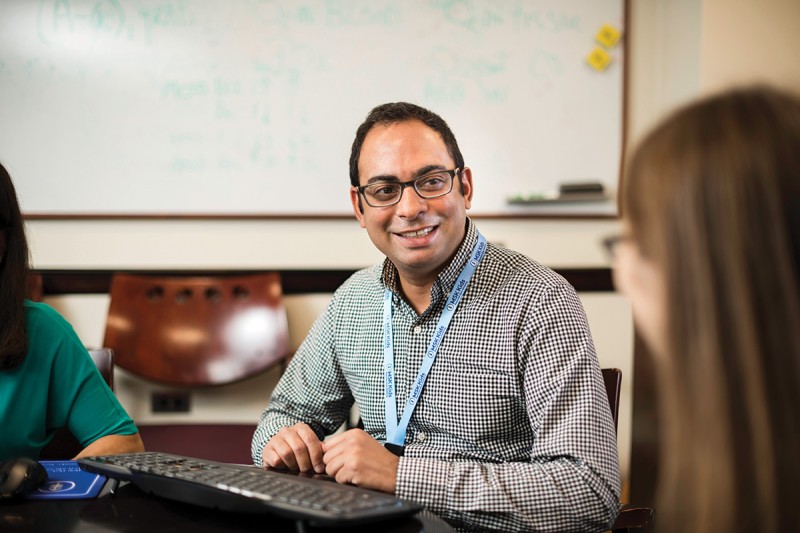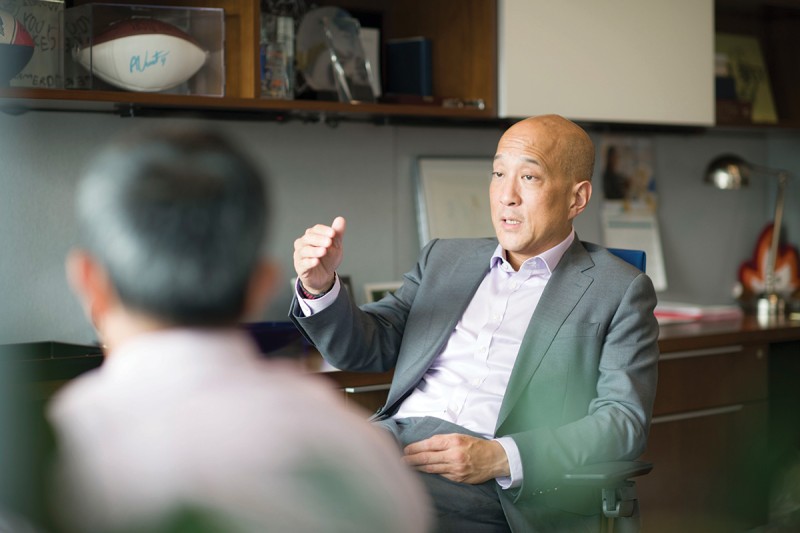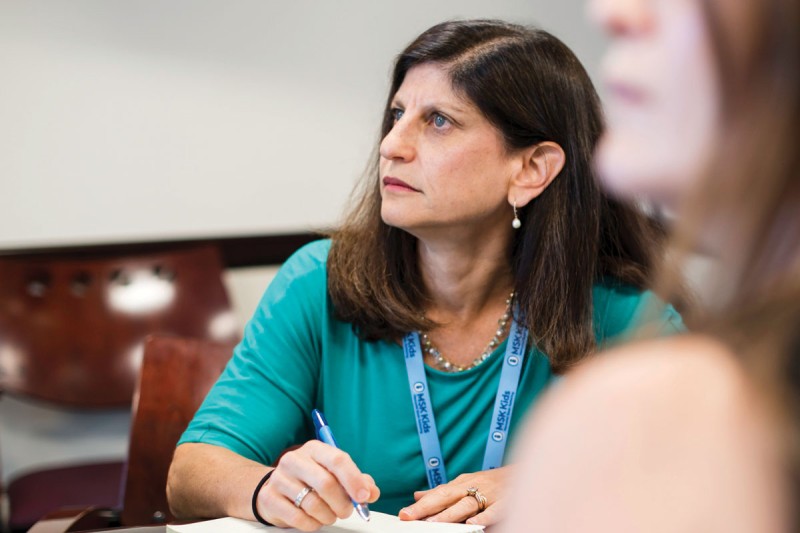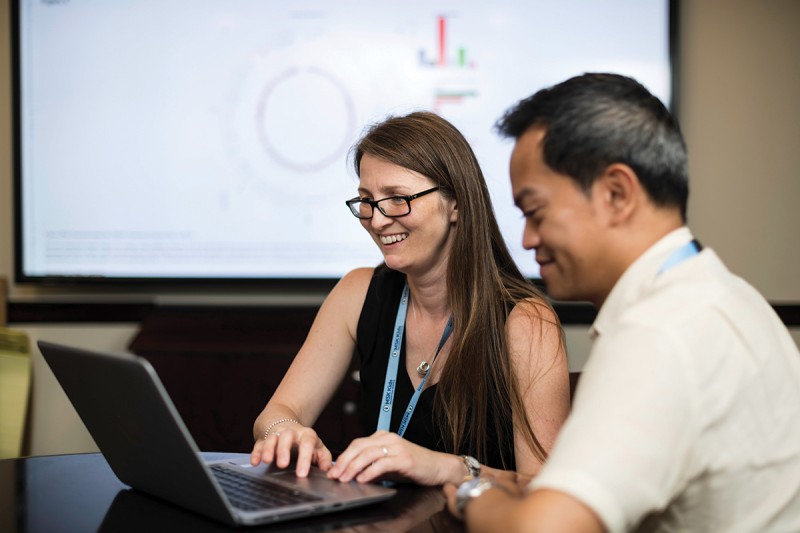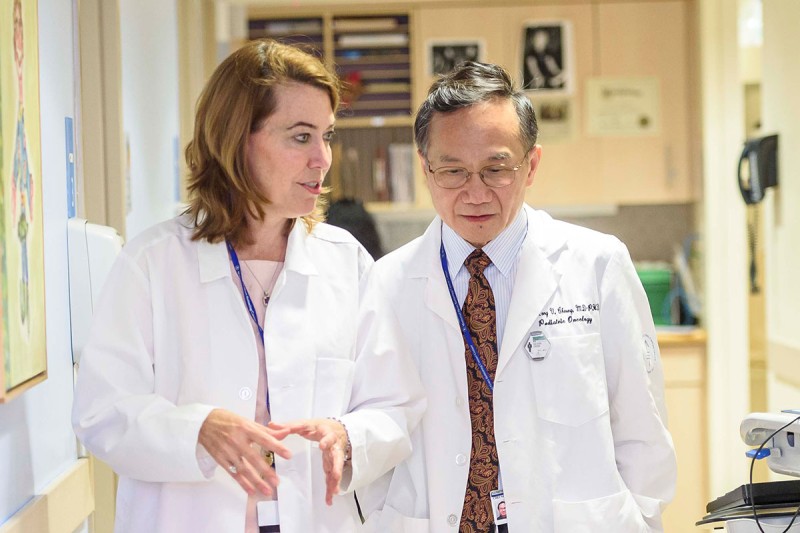Rihanna was born with a tumor on her upper right arm almost as large as her head. After chemotherapy failed to shrink it, her parents brought her to Memorial Sloan Kettering, hoping for a different outcome. “MSK’s doctors gave me a sense of confidence that they knew what they were doing,” says Rihanna’s mother, Ana.
And the MSK team delivered: They determined that Rihanna’s cancer was caused by a mutation in a gene called NTRK and focused her care plan on attacking the cancer-driving effects of that mutation.
At the time, MSK Kids pediatric oncologist Neerav “Neal” Shukla was leading a clinical trial for larotrectinib (Vitrakvi®), a drug that specifically targets NTRK. Within days of starting Rihanna on larotrectinib, the tumor began to shrink. Five months later, the remaining tumor was removed, allowing Rihanna to have full function of her arm. Now 2, she has shown no sign of the disease. “She is a happy, healthy toddler,” Ana says.
Rihanna's Story of Treatment on a Clinical Trial with Larotrectinib
Rihanna’s story illustrates the power of precision medicine. This practice is grounded in uncovering the genetic changes that drive a tumor’s growth and then finding the best drugs to stop them. Over the past two decades, precision medicine has helped many adults with cancer, leading to dozens of more effective, less toxic drugs for cancers of the lung, colon, breast, and more.
But the progress has been slower for children. MSK Kids is changing that: A major effort is underway to fully deliver on the promise of precision medicine for our youngest patients.
Successfully treating one child, like Rihanna, can do a lot to accelerate drug development to help many more kids. The trial she participated in resulted in the simultaneous approval of larotrectinib for both children and adults with NTRK-driven tumors. In the past, children often had to wait until after a drug was approved in adults before pediatric clinical trials were launched.
Making Progress in the Lab
These efforts are guided by MSK’s Pediatric Translational Medicine Program (PTMP), which is led by Dr. Shukla. The PTMP is involved in genomically characterizing patients’ tumors as well as developing new therapies. Through this program, all children cared for at MSK are offered comprehensive tumor testing. Being able to deliver therapies to the right target requires identifying the root cause of each tumor. This interdisciplinary approach is being spearheaded by geneticist Elli Papaemmanuil and her team of data scientists.
“We want to understand the genomic drivers of cancer in children, identify the key targets, and understand which patients will respond to targeted therapies. In this way, we can develop a treatment approach that is patient tailored and data driven,” Dr. Papaemmanuil explains.
Her lab has performed in-depth analyses on tumors from more than 120 children treated at MSK. “Our preliminary data have opened our eyes to the diversity and complexity of pediatric cancers,” she says.
“We have developed and optimized the processes required to deliver tumor analyses quickly enough to benefit patients,” she adds. “We have shown that this is possible.”
How Research Translates to Treatment
Part two of precision medicine is developing drugs that can potentially target the changes driving children’s tumors. Once a tumor has been characterized, members of the PTMP’s clinical research team take over and start working on treatments matched to changes in the cancer genome.
Doctors, molecular pathologists, and data and laboratory scientists work together to make treatment decisions based on what they’ve already learned about the underpinnings of pediatric tumors.
If a child appears to be a good candidate for a treatment matched to a genetic change in their tumor, the next challenge is gaining access to the drug. The best option is to enroll the child in an ongoing clinical trial. This is what happened with Rihanna.
“We aim to have a clinical trial available for every patient, but even common mutations are present in only 1 or 2 percent of pediatric cancers,” says Julia Glade Bender, a pediatric oncologist who is part of the PTMP. “Doing a clinical trial for every genomic abnormality that we find is just not feasible.”
For rarer mutations, a more specialized approach may be needed. “This is when we develop a single-patient use [SPU] treatment plan,” Dr. Glade Bender says. These compassionate-use plans require tremendous resources, including finding a company willing to supply a drug and getting permission from the US Food and Drug Administration to administer it. It can be a lengthy and labor-intensive process.
“We anticipate that many of the drugs we test in individual patients can eventually benefit a greater number of children with cancer,” says Dr. Glade Bender. So far, at least five drugs first given as SPUs at MSK Kids have progressed into pediatric clinical trials.
MSK’s efforts to develop drugs for kids go beyond the doctors and scientists who specialize in pediatrics. For example, clinical trials developed by MSK’s Early Drug Development Service can now include children as young as 12. (Previously, the age requirement was 18, as it is for most clinical trials.)
“As the largest pediatric oncology program in the world, we are well-positioned to deliver on the promise of precision medicine and to learn from every child who we have the privilege of caring for,” says MSK Kids Chair Andrew Kung.

